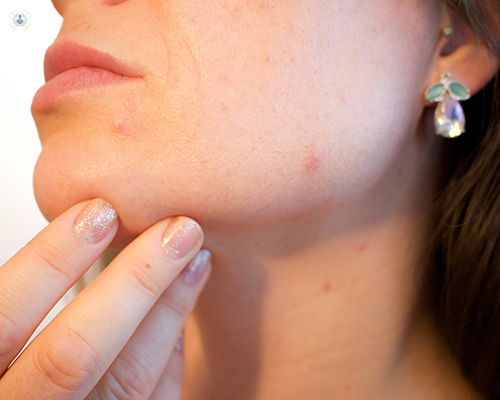What is a skin cyst, and what are the main risk factors?
Autore:Top Doctors recently spoke to highly experienced consultant general surgeon, Ms Cinzia Sammartino, who, here in this article below, describes what a cyst is, and details how cysts are normally removed.

What is a cyst?
A skin cyst is a round lump containing fluid just underneath the skin. Cysts can be found in several organs and on different parts of the body. Some skin cysts have a small, black spot in the middle.
Skin cysts can be smaller than a pea or grow to reach the size of several centimetres. If they get sore or red, this normally indicates that the cyst has been infected and thus will contain pus.
Why and how do cysts develop?
Anyone can get a skin cyst and the cause(s) is not always clear. Risk factors include a family history, age, female gender, acne and/or a rare condition called Gardner Syndrome.
Are all cysts the same?
There are different types of skin cysts, but the most common are:
- Epidermoid cysts: a cyst that develops on the top layer of the skin (epidermis)
- Pilar cyst: a cyst that forms in a hair follicle, usually on the scalp.
When should people see a specialist for a cyst?
Skin cysts are always a benign condition. The diagnosis is clinical (made during a physical examination), and it is unlikely that investigations are needed before surgical treatment.
If a test is indicated, an ultrasound scan will be performed to rule out other types of skin lumps. Patients typically see a specialist for a cyst when:
- the cyst is visible and is bothersome
- the cyst is large and painful
- the cyst became infected and thus needs to be removed
How are cysts usually removed? What options are available?
The removal of a skin cyst requires a minor operation. In the majority of cases, the procedure can be carried on under local anaesthetic. The procedure usually lasts 30 minutes to one hour and is done in an outpatient setting.
For large cysts, especially if infected and very inflamed, general anaesthesia is needed. Patients will need to come in on the day of surgery having fasted for six hours beforehand. It is very important not to burst a skin cyst to prevent the cysts from becoming infected.
Is it usual for cysts to recur after being removed?
Cysts can recur after removal, but this is not common. It is more likely that the patient forms new cysts.
Make sure you book an appointment with Ms Cinzia Sammartino today by visiting her Top Doctors profile.


